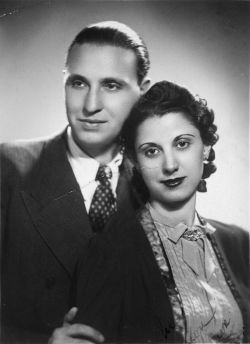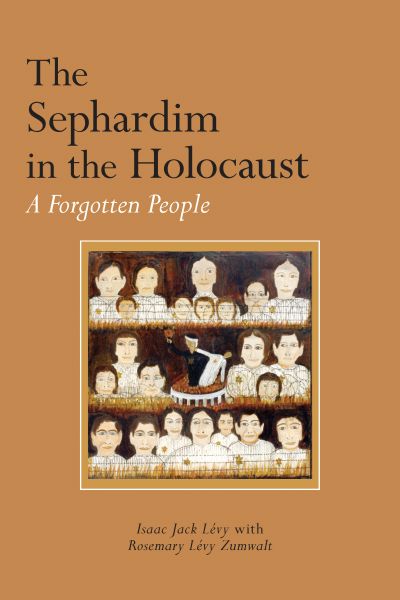Isaac Jack Lévy with Rosemary Lévy Zumwalt
THE SEPHARDIM IN THE HOLOCAUST: A FORGOTTEN PEOPLE
University of Alabama Press, 2020, 978-0817320713
Reviewed by Judith Roumani1
As Shmuel Refael, director of the Salti Institute for Ladino Studies at Bar-Ilan University, notes in a review quoted on the publisher’s website, this book is the fruit of many years of patient research as, tape recorder in hand, the main author tracked down and interviewed all the Sephardic survivors of the Holocaust they could find. This was a pioneering study begun in 1982, thus when Holocaust survivors were much younger and far better able to recall their ordeals. In those days, many were reluctant to speak their memories. The authors tell of interviewees who had been eager to testify, but then, when faced with the opportunity to speak, fell silent and could say nothing. More recently, a greater number have spoken out, impelled by a sense of duty and a belief that they survived, when so many others had not, in order to bear witness to the horrors they were part of. But speaking was always painful. Right after the war, the world was skeptical that such horrors could have taken place. Many years later, came new doubters and Holocaust deniers, perhaps impelling the reluctant witnesses to speak at last. Now very few of these precious voices can be heard any more, as memories fade and the survivors leave us. Thus, this volume brings an important and essential new collection of eyewitness reports.
When Isaac Jack Lévy and Rosemary Zumwalt began their research, little had been published on the Sephardim in the Holocaust. An exception, soon after they began, was an anthology of short studies edited by Solomon Gaon and Mitchell Serels, Del Fuego: The Sephardim in the Holocaust (1995), which brought together articles on Sephardim from Rhodes to mainland Greece, to Libya and Morocco. Only recently, though, have the experiences of the Sephardim in the Balkans and North Africa been attended to by numbers of scholars. Our two authors include interviews not only with Greek survivors but also with some who experienced the Holocaust in the Balkans, Cos, Rhodes, and North Africa, including Libya. The terrible experiences of the unfortunate Sonderkommandos, and rescue and shelter from Muslim families in Albania, are some of the outstanding points. It should be noted that Isaac Jack Lévy has also published a seminal work of Sephardic poetry of the Holocaust, and studies of Sephardic artists of the Holocaust, some in Sephardic Horizons.2
The authors were working on this book right up until the recent passing of Isaac Jack Lévy, a professor of Spanish and specialist in Sephardic poetry. Rosemary Zumwalt brought the book through the final phase to publication, in honor of her late husband.

Studio portrait of a Greek-Jewish couple. Photo credit: USHMM
Isaac Jack Lévy quotes his interviews in detail, and some of them are excruciatingly painful to read. There are many accounts of the terrible journey to Auschwitz, endless days without food or water, during which many of the impossibly crammed-in victims died. A car was opened: half the inmates were dead, and the other half had gone mad. Before the deportations, the rabbi had urged single young people to get married, on the assumption that married young women could be protected by their husbands. One couple had just married, and as the surviving husband relates, experienced the terrible journey instead of a honeymoon. The young wife constantly cried and asked her husband how much longer it would take. On arrival, when the prisoners anticipated some respite from the journey, they stepped out into hell on earth, as the young woman like so many others was immediately selected for the crematoria, and the grieving husband was sent for slave-labor. Far worse, unspeakable experiences are told by interviewees, for whom the telling brings back their unending pain.
To expand his history to other Sephardic communities, the main author has also interviewed Jews of North Africa, particularly Libya. These interviewees bring new, personal angles on events in Libya: the little-known imprisonment for example of two thousand Jews from Benghazi in the Fascist concentration camp of Giado, in the Libyan desert. Over five hundred died from starvation, cholera, and maltreatment at the hands of Italian Fascists. The last chapter, which also includes material from interviews, deals with the religious and philosophical dilemma of where was God during the Holocaust? Victims and survivors, even religious leaders and rabbis, bring us their bleak and sometimes despairing opinions. One informant sidesteps the issue of where God was, by changing the question to ‘Where was man?’ A profound question also, but a different one that does not yet constitute an answer to what is perhaps ultimately unanswerable.
I would only quibble in a minor way with the authors’ totally positive presentation of the Italian colonization of Rhodes. Perhaps other Rhodeslis hold the same opinion, and Isaac Jack Lévy spent his first ten years on the island, under the Fascist regime, so who am I to dispute this? It is generally accepted among scholars that elsewhere, such as in Libya, the Italian colonial regime was not a kind one and atrocities were committed against Jews, Arabs, Berbers, and other indigenous peoples, as well as against Allied prisoners that the Italians had taken. Even earlier, in Italy’s conquest of Eritrea, there had been brutality. Rhodes probably escaped Italian harshness because the Nazis displaced Mussolini’s troops. The Jews of Rhodes still on the island were almost all murdered in the German death camps, leaving to the generation that had escaped earlier, many to America, to take up the burden of telling their tragic tale.
This passionately told analysis of the experience of Sephardim in the Holocaust comes from the heart of one who in 1939 was a ten-year-old boy torn from his roots in Greece and precipitated across the world to an alien continent. Isaac Jack Lévy, whose last scholarly labors were devoted to finishing this book, together with Rosemary Zumwalt, interviewed over 170 survivors from 1982 onward. Memories were still vivid, and the cassette tapes and transcripts captured not only voices but silences when no words came to express the unspeakable. The raw emotions touch the reader far more deeply than documentary evidence ever could.
1 Judith Roumani is the editor of Sephardic Horizons.
2 “Habib Gerez: Humanist, Artist, and Poet,” in Volume 10, Issue 1 Winter 2020; “Alberto Sarfati , ‘The Painter’,’’ in Volume 8, Issue 3&4, Summer-Fall 2018; and by Rosemary Zumwalt, “Stories, Food, and Place: Following a Sephardic Family to a New Home,” in Volume 6, Issue 1, Winter 2016.

